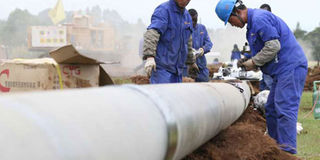Kenya Pipeline sets up training school to cut labour fees

Kenya Pipeline Company employees work on an oil pipeline at Cheplaskei, Eldoret town, on September 15, 2010. Kenya is spending over Sh3.6 million monthly on imported manpower from as far as Nigeria and South Africa to weld and coat the new Mombasa-Nairobi pipeline alone. PHOTO | JARED NYATAYA | NATION MEDIA GROUP
What you need to know:
- The country, which wants to tap into its upstream oil production by 2022 may need even more expatriate labour to service the expected oil returns.
- There is also a Lebanese and 19 Nigerians coaters who get about $1,000 a month on average, plus food and accommodation.
The Kenya Pipeline Company (KPC) has set up a local training school for specialised skills to save on costs incurred in hiring foreign experts to work on the country’s oil and gas infrastructure.
Kenya is spending over Sh3.6 million monthly on imported manpower from as far as Nigeria and South Africa to weld and coat the new Mombasa-Nairobi pipeline alone.
The country, which wants to tap into its upstream oil production by 2022 may need even more expatriate labour to service the expected oil returns.
KPC Managing Director Joe Sang said the training school followed by the launch of an oil and gas pipeline curriculum, is set to increase the country’s number of skilled labourers in the nascent sector.
“We’ve decided to have a school that we are going to train our young people on oil and gas courses. For the first year, we’ll do it for Kenyans and then in the second year we will invite students from Uganda, South Sudan and even Tanzania,” he said.
Kenya is currently paying eight Lebanese, one welding machine expert and three Chinese (for crossings) an average $1,500 a month plus allowances for food, accommodation and overtime remuneration for work on the Mombasa line.
There is also a Lebanese and 19 Nigerians coaters who get about $1,000 a month on average, plus food and accommodation.
The line has 56 welders and 41 coaters in total.
Mr Sang said the school, the first in the region and third in Africa after Algeria and South Africa, will be located at its Morendat facility in Naivasha and will initially offer six courses.
The problem of skills gap has been denying Kenya a big portion of mega projects, with most employees confined to menial labour.
Although Kenya has some of the most educated population in the region, unemployment is running at around 40 per cent, with some companies struggling to hire adequate qualified talent.
China Road and Bridge Company (CRBC) opened a school in Voi to train Kenyans on railway construction, operation and management to teach steel assembling, bricklaying and masonry, scaffolding, railway technology and safety, as well as environment management.
According to the Quarter 1 Talent report 2015 by Cooperate Staffing Services Limited, many firms are finding it difficult to attract the right quality of prospective graduate employees.
The report says employers find it challenging to attract workers with attributes such as, technical expertise, knowledge of the relevant industry, quality of learning and market exposure.





